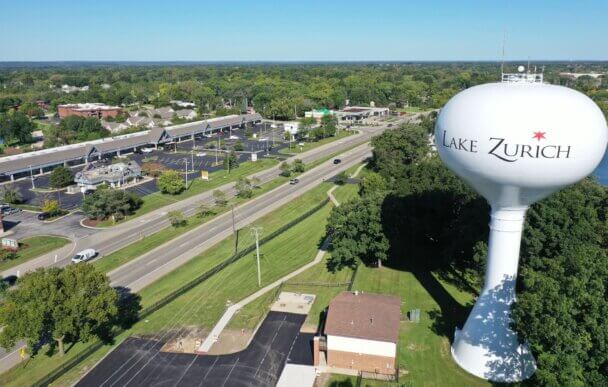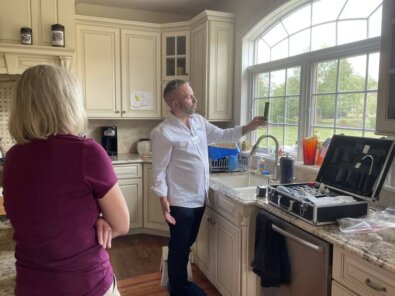Facing hard water issues in Lake Zurich, IL? Angel Water is aware of the specific water challenges residents encounter here. Our premium water softening systems are designed to eliminate excess calcium and magnesium, ensuring you receive soft, clean water for your home or business. With over 50 years in the water treatment industry, we are dedicated to enhancing your water quality and ensuring your complete satisfaction. So, if you need water filtration equipment and supplies or the services that go with them, please don’t hesitate to stop in or reach out.
Water Softener Companies
in Lake Zurich, IL

Quick Start Guide for Solving Lake Zurich Water Issues
- Reach Out – Call or submit a form to learn more and schedule an appointment.
- Water Testing – We’ll come to your home to test your water to understand your water problems.
- Discuss Our Findings – Learn what’s lurking in your family’s water and have your questions answered.
- Recommend Solutions – Our water expert will recommend equipment to remedy your home’s unique issues.
- Execute Your Clean Water Plan – We’ll install and maintain the water quality equipment needed to address your water issues.

Local Water Problems in Lake Zurich, IL
Lake Zurich is a village in Lake County with plenty to offer residents. Grab a local brew while listening to local musicians at Copper Fiddle Distillery before having a bite to eat at French-inspired D&J Bistro, the first bistro in the Chicagoland region. Let the kids run off some energy at Henry J. Paulus Park or The Treehouse Play Café. Everywhere you turn, there’s something exciting to do and see.
Unfortunately, Lake Zurich is also home to some local water problems…
Where Does Lake Zurich’s Water Come From?
According to the Lake Zurich Water Department, Lake Zurich receives water from several deep aquifers. Treatment plants inject chlorine into the water before it reaches faucets across town. Plants also use ion-exchange systems to remove naturally occurring radium, which also decreases the water’s hardness.
What’s Lake Zurich’s General Water Hardness?
Over the years, local water hardness has plummeted from an unusual 14 grains per gallon to a more moderate 6 grains per gallon. In comparison to other nearby cities, this level of hardness isn’t particularly good or bad. At 6 grains per gallon, Lake Zurich’s water hardness can still have many adverse effects, including cloudy stains on dishes, faded clothing and dry or brittle hair.
What’s Lake Zurich’s General Water Quality?
By EPA standards, Lake Zurich’s water is safe for consumption, but these standards don’t actually reflect safety. As the EWG asserts, there should be no contaminants in the water. With far more stringent standards, the EWG highlights the presence of all contaminants either below legal limits or otherwise.
The following chart shows contaminants that exceeded safe levels in Lake Zurich from 2014 to 2019:
| CONTAMINANT | TOTAL |
EWG RECOMMENDED
|
| Haloacetic Acids (HAA9) | 4.57 ppb | 0.06 ppb |
| Radium 226 and 228 | 3.18 pCi/L | 0.05 pCi/L |
| Total Trihalomethanes (TTHMs) | 6.28 ppb | 0.15 ppb |
Let us show you what problems these contaminants can cause.
Haloacetic Acids (HAA9)
Haloacetic Acids are byproducts of the chlorination process. They dry out your skin at best and give you cancer at worst. Local governments are right about one thing: Cleansing water prior to consumption is better than letting it flow straight from the ground to your mouth. While this cleaning process is important, there are other steps you can take to improve the quality of drinking water in your home.
The following haloacetic acids exceeded EWG guidelines in Lake Zurich:
- Dichloroacetic Acid
- Trichloroacetic Acid
Dibromoacetic acid and monochloroacetic acid were also present, but they were beneath their respective thresholds.
Radium 226 and 228
This radioactive element naturally presents itself underground. It can leak into groundwater, and activities like fracking can elevate its presence among water supplies. Drinking radium over time can cause bone cancer, among other forms of cancer.
Total Trihalomethanes (TTHMs)
TTHMs are also byproducts of water treatment. Of all TTHMs, bromodichloromethane is most common in Lake Zurich, more than 1 ppb above the recommended limit. Like haloacetic acids, TTHMs are also carcinogenic.
The following TTHMs also exceeded safe levels in Lake Zurich:
- Chloroform
- Dibromochloromethane
While the EWG has also detected bromoform in the water, its levels do not exceed standards.
Other Contaminants
Beside pollutants above the EWG’s limits, there are many others present in Lake Zurich’s water, including:
- Fluoride
- Germanium
- Manganese
- Nitrite
- Silver
- Strontium
Though these contaminants don’t exceed recommended limits, the EWG asserts that their presence is inherently problematic. Please feel free to learn more on the EWG’s page for Lake Zurich.
Water Softener Installation in Lake Zurich, IL
At Angel Water, we go beyond simply providing water softeners; we specialize in their expert installation for our Lake Zurich clients. Our licensed plumbers are dedicated to your family’s safety and follow Illinois plumbing regulations closely. We approach every installation with great care because improper plumbing can introduce harmful bacteria, viruses and other contaminants into your drinking water, which could pose health risks to your family.
Water Softeners in Lake Zurich, IL
Water softeners come in a range of sizes, makes and models, including those with advanced features, to address the specific needs of every Lake Zurich home. Whether you have city or well water, Angel Water offers a solution tailored to your water-softening needs. For our Lake Zurich customers, we highly recommend the PurASoft ERRC3702 for its outstanding reliability and performance.
Reverse Osmosis Systems in Lake Zurich, IL
Our Lake Zurich reverse osmosis systems are engineered to protect your home’s drinking water from harmful toxins like cyanide, lead, mercury and hexavalent chromium. Many advanced RO systems also include carbon filters that improve the taste and odor of tap water, which can encourage more frequent drinking and better hydration. This, in turn, can lead to improved overall health.
Chlorine Injection in Lake Zurich, IL
A chlorine injection system is highly effective at addressing common tap water problems, such as unpleasant odors and sour tastes. It works by eliminating bacteria and oxidizing toxins, which enhances the smell and taste of your well water. Additionally, a chlorinator helps safeguard your home’s plumbing and supports your family’s health by ensuring high water quality.
Whole House Filters in Lake Zurich, IL
Whole-house filters in Lake Zurich provide a thorough solution by purifying every drop of water in your home. This comprehensive approach not only enhances the quality of water for drinking but also tackles common household problems such as chlorine odors, metallic tastes and fading clothing.
Sump Pumps and Battery Backups in Lake Zurich, IL
We provide sump pumps and battery backups to shield your Lake Zurich home’s basement from flooding and water damage. Basement water damage can cause serious health and structural issues, such as respiratory problems, severe allergies, mold growth and foundation cracks. Angel Water is dedicated to protecting your family and property with these dependable solutions.
Water Heaters in Lake Zurich, IL
If you’re dealing with cold showers, increasing energy bills or low water pressure without obvious cause, your water heater could be at fault. Fortunately, Angel Water provides a variety of electric and gas water heaters from top brands tailored to meet the needs of families and homes of all sizes and water usage levels.
Alkaline Water in Lake Zurich, IL
Many Lake Zurich residents recognize the importance of maintaining the body’s pH balance for overall health, as an overly acidic blood pH can lead to various health issues. To support this, Angel Water offers an Alkaline/Remineralizing System that can be easily added as an upgrade to your existing reverse osmosis system.
Water Softener Maintenance in Lake Zurich, IL
Regular maintenance of your water softener is essential for the ongoing protection of your home and family. Routine service visits address common issues like leaks, salt usage and low water pressure. By staying proactive with maintenance, you ensure your water softener functions effectively, extends its lifespan and maximizes your return on investment.
Water Testing in Lake Zurich, IL
The only way to determine what toxins are in your home’s water supply is through water testing conducted directly from your faucet. City water reports are usually done at the street level and may not reveal any contamination that could occur between the street and your home. If you use well water, no regulatory agencies are testing it, so it’s your responsibility to ensure its safety.
Plumbing Services in Lake Zurich, IL
In Illinois, licensed plumbers are required to install water filtration equipment, and Angel Water strictly follows this regulation. We prioritize your family’s health and understand the risks associated with improper plumbing practices.
Why Choose Angel Water?
Expertise:
Over 50 years of experience in resolving water quality issues.
Advanced Technology:
Our water softeners use the latest technology for efficient operation.
Customer Satisfaction:
Free water analysis and customized solutions tailored to your needs.
Qualified Professionals:
IDPH Licensed Plumbers in Illinois ensure high-quality service and regulatory compliance.
Highly Rated:
Over 1,000 5-star ratings on Google demonstrate our dedication to excellent service.
Licensed Plumbing Company:
The only water softening company in Illinois that is also a licensed plumbing company.
Lifetime Warranty:
The only company offering a lifetime warranty on our ERR-3700 series filters.
A+ BBB Rating:
An A+ rating with the Better Business Bureau shows our commitment to quality service.
Learn More About Water Quality in Lake Zurich, IL
Angel Water is dedicated to keeping our customers informed about the latest news and information surrounding local water quality, the equipment that treats it and related topics. If you want to learn more about water, check out our extensive resource library. You’ll find videos, blogs, FAQs and much more on these topics.
Water Softener Companies in Lake Zurich, IL
Are you looking for top-notch water filtration equipment, water heaters or sump pumps and battery backups? Want to pair the best equipment with unrivaled customer service? Call Angel Water today at (847) 382-7800 or complete the contact form below to get started! We look forward to hearing from you!
Get Started With a FREE Water Test
Just fill out the form below and we will reach out to
schedule the best time for your free water test!

